Complaints drop around virus control

A customer shows his health code to a waitress before entering a restaurant in a shopping mall in Chaoyang district of Beijing, capital of China, June 6, 2022. [Photo/Xinhua]
The number of complaints regarding excessive COVID-19 measures filed to an official bulletin on the National Health Commission's website has dropped significantly, suggesting that efforts dedicated to rectifying irregular virus containment practices have paid off, a health official said recently.
The State Council's Joint Prevention and Control Mechanism on June 5 listed nine practices that should be prohibited in response to growing reports that local governments were imposing additional COVID-19 restrictions, such as forcing people traveling from low-risk areas to undergo quarantine, extending isolation time without authorization or refusing to let through truck drivers traveling on expressways.
The National Health Commission launched a message board on June 28 to receive and help address problems submitted by the public. Eleven other government departments, including the Ministry of Education and the Ministry of Transport, as well as provincial-level authorities also set up channels for collecting relevant issues in the following days.
The daily number of messages delivered to the commission peaked on June 29 at 4,850, but has been trending downward since then, according to Cheng Youquan, deputy director of the commission's bureau of inspection and supervision.
"In recent days, we got about 400 to 500 complaints every day, showing that efforts devoted to resolving issues of implementing unnecessary COVID-19 curbs have worked," he said during an interview with a publication administered by the Central Commission for Discipline Inspection of the CPC and the National Supervisory Commission.
The bulletin has received nearly 19,000 messages and more than 97 percent of them have been successfully addressed.
Cheng said that most problems concern expanding types of groups that should be put in isolation and extending quarantine periods.
For instance, Qinghai province had required all people returning from low-risk areas to complete two nucleic acid tests within three days after arrival and used paper seals to prevent them from going out during the period. The requirement was later scrapped, according to the commission.
"Releasing the list of nine prohibitions is intended to prevent local authorities from oversimplifying virus control measures, adopting one-size-fits-all approaches or imposing additional curbs," said Cheng.
"The ultimate goal is to effectively contain the virus while reducing the impact on normal lives and production," he said.
Photos
Related Stories
- Chinese mainland reports 148 new local confirmed COVID-19 cases
- Europe engulfed by new COVID-19 wave, says ECDC expert
- Reach of COVID-19 pandemic could be wider than previously thought: poll
- Chinese mainland reports 108 new local confirmed COVID-19 cases
- Vice premier says China not loosening COVID response
Copyright © 2022 People's Daily Online. All Rights Reserved.









